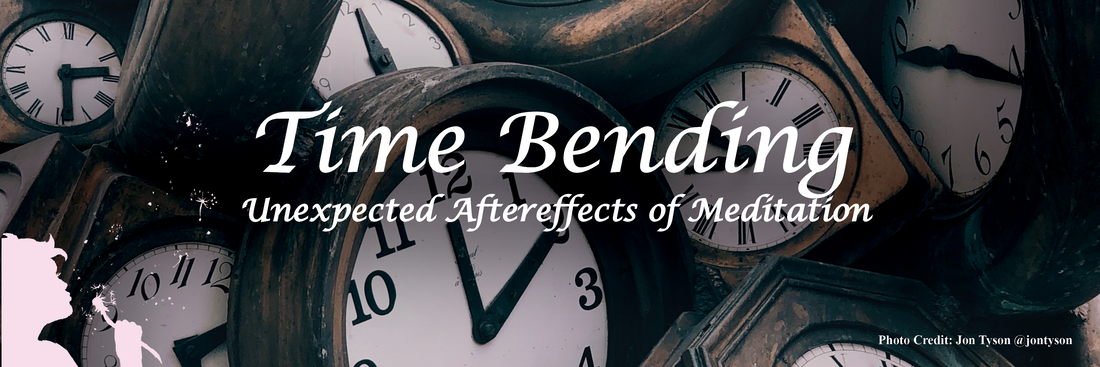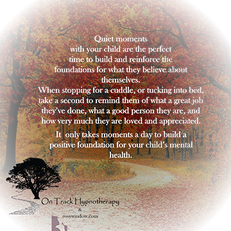|
Note: The following is an excerpt from the Rosy Window, online guided imagery course for parents and caregivers. Full course available summer 2020. We all want the best for our children and being a positive, and effective guide on their journey is an important, yet daunting task, to say the least. When asking what we can do to support them in becoming the best versions of themselves, the answers are never easy, and are often different for each child and each family. However, there are a couple overarching themes when it comes to improving the life of a child. Successful adults can often attribute their accomplishments and happiness to one or both of the following: possessing a growth mindset and having a supportive person in their lives to whom they can look up to and feel important around, i.e., a mentor.
The Power of a Mentor When researching resilience in children, one of the common factors was mentoring. Resilient children often had at least one adult take notice, and step in to support them in some meaningful way (Bellis et al., 2017). In Rom Brafmans book, Unlikely Success: Why Some People Flourish Where Most Others Fail (2011) he calls these people “satellites”. These ‘satellite’ people offer constant, unconditional support and acceptance, “with no strings attached” (Brafman, 2011, ch. 7). Meaning that they regard, in this case, the child with positivity and offer their time and caring while expecting nothing in return. Brafman (2011), goes on to site studies in the workplace, orphanages, and in organizations like Big Brothers & Big Sisters, where, “the presence of a supportive, satellite figure is one of the differentiating variables that separate those who overcome life's obstacles, from those who succumb to them”(ch. 7). In the case of Big Brothers & Big Sisters, a one and a half year study by Tierney, Grossman & Resch (2000), looked at a group of children paired with a Big Brother or Sister, and a control group of children who remained on the waiting list. The results showed that children actively participating in the program were 45.8% less likely to use drugs, 32% less likely to engage in violence, missed 52% less days of school and were reported to lie to their parents 37% less often (p. 20-28). Mentors are not just for those children deemed ‘at risk’ or ‘in need’. Studies and interviews with a number of high-achieving adults, show that having a mentor with the correct qualities can help build confidence and success in anyone at any age. A study conducted by Ellen A. Fugensun of George Mason University, showed that adults who had mentor in the workplace contributed greatly to career growth, no matter their job position or level (Brafman, 2011, ch. 7). The Handbook of Youth Mentoring Second Edition (2013), shows how a mentor can help to develop the positive strengths and mindsets associated with building social and behavioral skills as well as cognitive abilities (this entire handbook is an amazing resource and can be found online in Google Play or through Amazon). Growth Mindset vs. Fixed Mindset In her book Mindset: The New Psychology of Success, Dr. C. S. Dweck outlines the two types of mindset held by children (and adults); fixed and growth. With a fixed mindset, the person views intelligence as a set trait and something that does not, or cannot change over time. These types of children believe that they are as smart as they are ever going to be, and that is that. Growth mindset children, on the other hand, see intelligence as something that can be developed. They believe that learning and practice can lead to having a higher level of intelligence and this belief lends itself to a number of positive traits including a desire to learn, perseverance and a tendency to embrace change (p. 245). Most importantly, children with a growth mindset view failure as a learning opportunity, rather than a personal statement on how smart or capable they are. Cultivating a growth mindset in your children is invaluable, not only in increasing their chances of success, but in supporting a healthy vision of who they are as a person and what they can achieve. Practical Application: Giving your child the advantage. The following are some simple ways you can facilitate a growth mindset in your child, as well as information on how and where to find a “satellite” figure or mentor. It should again be noted that these two strategies are not reserved for those children who we deem “in need” of extra support, believing that intelligence can evolve and be improved is a mindset that breeds success and personal fulfillment in anyone and everyone. And having a mentor, an outside influence with the aforementioned traits is again, an advantage to all people, no matter their age, station, aspirations, desires or personal views. Mentors and growth mindsets are an asset for everyone. Two Keys to Fostering a Growth Mindset As a caregiver, teacher or friend, one key to helping children in believing that intellectual growth is possible, is to demonstrate the belief; be the example. So what does that look like? 1. Embrace failure and learn from it. In an interview with Sara Blakely, the founder of the multi-national, billion dollar Spanx company she attributes much of her success to the way her father viewed failure as highly valuable. Dinner conversation often centred on what each family member failed at that day and what they would do differently next time. These chats led Sarah to adopt a key aspect of a growth mindset, and use her failures as scaffolding to reach her goals. Each unsuccessful endeavor meant a way to learn and improve. (Robbins, 2020). Discussing failure in this light is a great practice and one you can begin right away. Remember that it is important to not only adopt this approach with things your child may be struggling with, but also with your own failed attempts as well. Talk about something you tried that did not go as planned, and be sure to think aloud, or discuss what you learned from the experience, and what you will do differently next time. There is zero shame in failure. It is how we learn. Help your child break down their mistakes, misadventures and disappointments in a positive, productive way, gathering the important information to make a better plan for next time. 2. Practice Productive Praise. When your child is successful, the way you react to their success and the form your praise takes is important. There are several schools of thought on praise, and in keeping with our goal of fostering a growth mindset, we look at the advice shared by Dr. Dweck (2006), give praise in a way that comments on the child’s efforts and achievements, rather than their personality traits (p.178). This means using statements such as, “All of your practice and hard work really paid off! Look how well you’ve done on this test!” rather than, “Great job on this test! You’re so smart”. The first statement leaves room for having a productive conversation and pride in themselves, no matter the outcome of the test. If they were disappointed with their mark, the conversation could address the amount of hardwork and practice the child has done already, and how and what they could do differently in the future to improve. Adversely, if you praise the good test results by attributing it to their level of intelligence, if they are disappointed with the marks they got they will blame themselves for not being “smart enough”. This will potentially lead them to view the test results as out of their hands and not seek ways to do better next time. Helpful words and phrases: Praise their:
Mentors/Satellites 1. Becoming a mentor: Roles and Traits. As mentioned before, the basic traits of a mentor or satelite person are as follows:
2. Finding a mentor. While being a role model for your children is paramount, one of the key elements of children having a satellite person in their life is that they are, or are perceived as, someone on the ‘outside’ of the immediate family circle. This can mean anything from a grandparent to a coach, but does not often imply an immediate caregiver. So where can we find that person for our children?
These two elements of success will not only impact what your child can and will achieve, but who they will become. The mental health benefits to having a mentor are well documented and possessing a growth mindset, as we have discussed, lends itself to many positive character traits and personal beliefs. The references listed below include some fantastic books and articles on these topics and more in the areas of success, and resilience in children. Further reading and research is always encouraged! -M References: Bellis, M. A., Hardcastle, K., Ford, K., Hughes, K., Ashton, K., Quigg, Z., & Butler, N. (2017). Does continuous trusted adult support in childhood impart life-course resilience against adverse childhood experiences - a respective study on adult health-harming behaviours and mental well-being. BMC Psychiatry. 17(110), 1-12. DOI 10.1186/s12888-017-1260-z Brafman, R. (2011). Unlikely success: Why some people flourish where most others fail. Penguin Random House Audio Publishing Group. Canfield, J. (2005). The success principles: How to get from where you are to where you want to be. Collins. Dubois, D. L., & Karcher, M. J. (Ed.). (2013). Handbook of youth mentoring.(2nd ed.). SAGE Publications. Dwech, C. S. (2006). Mindset: The new psychology of success. Ballantine Books. Ferriss, T. (2016). Tools of titans: Tactics, routines, and habits of billionaires, icons, and world-class performers. Houghton Mifflin Harcourt. Robbins, T. (Host). (2020, March 9). Start small, think big, scale quickly [Audio podcast episode]. In The Tony Robbins podcast. Robbins Research Institute. https://tonyrobbins.libsyn.com/start-small-think-big-scale-quickly-spanx-founder-sara-blakely-on-how-to-bootstrap-a-billion-dollar-business Tierney, P. J., Grossman, J. B., & Resch, N. L. (2000). Making a difference: An impact study of big brothers big sisters. Public/Private Ventures. Retrieved from https://www.researchgate.net/publication/242542499_Making_a_Difference_An_Impact_Study_of_Big_Brothers_Big_Sisters Who we are. (2014). Big Brothers Big Sisters International. Retrieved January 20202, from http://www.bbbsi.org/about-us/
0 Comments
Of all the benefits of meditation, the one that has surprised me the most and brought the most value to my life is the effects of meditation on time. I have long been well versed in the many benefits of meditation, and know that it is a daily ritual of just about every high achieving person you hear about these days. Getting it into my daily practice has been a bumpy road, but I have always persevered, knowing that it was an important part of the person I want to be. Before it became a habit, I had all the excuses for not meditating regularly and some of these may sound familiar to you; - scattered schedule - no perfect ‘place’ to do it - being embarrassed to do it in front of others - not knowing how to do it "properly" - too many failed attempts in sticking with it - not wanting to do it if I couldn’t do it for a specific amount of time - not having enough time (Ask anyone who meditates regularly and they will tell you that if you think you do not have enough time for meditation, than taking time to meditate is EXACTLY what you need!) Once meditation became a regular and constant part of my daily routine, it didn't take many days before I felt calmer, my feelings of anxiety decreased, I slept better and felt happier in general. And then the coolest thing happened, one day, as I was calmly going through my busy schedule, I checked the last thing off of my 'to-do' list and realized that I had accomplished all I had set out to do for the day and that the day wasn't even over yet! I mean, this wasn't actually groundbreaking or anything at the time, because we all have those magical days now and then, but when the pattern continued for the rest of the week, it made me stop and take notice. Shortly after this discovery, the holiday season hit and as many of you can probably attest to, though the holiday season is one of the best times of year, it can also be the worst time for self care and healthy habits. We get so busy that we put those things on hold for a while. During the holidays that feeling of having extra, or even enough time for that matter, seemed to disappear. One could chalk this up to actually BEING busier, with all that goes into family and Christmas and what have you, but during this time, I stepped away from work and school, so technically, I was less busy. After all of the merriment abated and it was back to real life, I picked up where I left off with my daily rituals and lo and behold, it only took a couple of days before the feeling of having more time returned. At that point it was as if the skies parted, light shone down upon me and I could hear the singing of angels, my prayers had been answered! As a stay at home mom to 2 toddlers, a wife, a keeper of the home, a student (I am currently working on my second degree) and a business owner, a little extra time is a bit of a big deal. For so long one of my biggest wishes in life was to have more time. I wanted at least 3 more hours in each the day, to get done all the things I wanted and needed to do. And at least 3 more hours each night, just to feel like I’ve had something close to the proper amount of sleep. I wished for my children to stay each the age they were for at least an extra year. One year of my son being 2 was not enough for me, I wanted it to all last longer. Time moved too quickly and there was never enough of it. Anyone else have this problem? According to social media, the answer is a resounding YES! Now, I’m not a quantum physicist, but I was fairly sure stretching time wasn't actually something that was possible, yet the results were right there, everyday. So, as is my nature, I started to research. Though I haven't found anything to say that meditation actually adds more time to your day, (which is probably a good thing, as this would wreak havoc on your calendar and schedule, trying to do the math to be sure your at your 9:30 meeting on time now that you're personally running off a 30 hour clock, while all the other suckers are still using 24.) But there are reasons why I was getting the results I was. It was a perfect storm of the benefits of meditation coming together to give me the illusion of bending time. With daily meditation I became;
These changes made me more productive and had me moving through my day in a peaceful and very present way. At the end of the day, when I lay down in bed and looked back on what I had accomplished, I could remember little moments that otherwise may have been lost in the busy buzzing of my brain before meditation became part of my life. Being able to remember more of the day, made it feel like there was actually more day to remember. Before regular meditation, I used to go about much of my day on autopilot, missing what was going on around me. I was often guilty of being 3 steps ahead of myself mentally - planning or worrying about what I was doing next. Or sometimes being months or years behind - obsessing over some random embarrassing incident or conversation that had happened ages ago (thank you anxiety!). Try to focus on the task at hand when you're planning tomorrow's rout for running errands or berating yourself for that time you accidentally overshared to you boss and he stared at you blankly before making a beeline for the staff room door. Living in the 'now', along with having heightened self-awareness helped me in setting more achievable goals, and being extra focused and creative allowed me to blast through my to-do lists. It is fantastic. This gift of extra time is something I want to share with the world! And if more time or presence are not something you're after, or feel you need to work on, the myriad benefits of meditation have something for everyone. Anchor Dan Harris wrote an entire book on how regular meditation just made his life “10% Happier” overall, and I mean, who can say no to that? Having trouble getting started? Here are some tips and tricks I’ve learned along the way: 5 Tips for Successfully Making Meditation a Daily Habit 1. Don’t be too picky about setting. With two small children at home, my dream of sitting in my little home gym with the lights low, my oil diffuser on and binaural beats playing over the speakers, just wasn’t in the cards. We usually do it in the upstairs living room sitting on the floor or couch. 2. Don’t put too much pressure on yourself. I’ve heard and read many a tale of the amazing, existential experience people have during meditation and was wondering what the heck I was doing wrong. Most of my meditation was just me repeatedly reminding myself to stop thinking about whatever it was my mind wandered to, and to focus on what I was doing. Finally, a wise friend, who is well versed in meditation and mindfulness told me to relax and not put so much pressure on myself, that there was no “wrong” way to meditate. She was right. 3. Find some methods that work for you and don’t be afraid to switch it up! Some days I focus on breath, some days it’s a visualization, sometimes I concentrate on chakras, sometimes I chant and sometimes nothing seems to be clicking so I just sit quietly. But I do it in some form every day - and that is key. 4. Some minutes are better than none minutes. Research shows that benefits of meditation can start with doing as little as 5 minutes a day. When I started, I did 8 minutes (which was all my kids could handle at the time - more on that next) and slowly added a minute or two over time. I’m currently meditating 15 minutes a day, with aspirations to keep slowly adding. 5. If you can’t beat ‘em, join ‘em. This was a BIG one for me. With two small kids, I tried for a long time to make time to meditate on my own. My biggest plan was to get up early enough to do it before they awoke, this failed as my son is an early riser and was hard to beat. Even if I did manage to get up before him, I was on edge listening for the baby monitor. Then I tried taking time to meditate after they had gone to sleep. This failed for a few reasons, one, again, the baby monitor, two, evening was time to be with my partner, (whom, due to my own little insecurities, I didn't love meditating in front of) and three, I was just so tired by then that the thought of anything even slightly productive (even if it was relaxing) didn’t hold much appeal.
Namaste, Lovelies! -M From before our babies are born, we begin loving them and building the foundations that encourage health & happiness. They grow and learn quickly, taking in all that is around them, like sponges. We are not in control of how they perceive information, and there are days that they must hear “no” far too many times, (especially toddlers).
But, positive reinforcement of the foundations we believe in, can be easy. During a calm moment, settling in for a nap, tucking in for the night, or just that cozy relaxed cuddle, tell them those important bits. Remind them what a good kid they are, how much you love them, what a good job they did, how smart they are. A child’s subconscious is very open, but those moments of quiet are a perfect time to reinforce foundations. -Bev Counseling Hypnotherapist, On Track Hypnotherapy Children should be proud of their accomplishments.
Pride means finding joy and satisfaction in a job well done. Pride means feeling admiration for yourself and value in what you have achieved. Pride, authentic pride - not bragging, boasting or seeking outside approval - is an essential part of self-esteem. Encourage your children to take pride in what they do and MODEL IT FOR THEM. Take pride in your accomplishments! You have accomplished so very much, from learning to drive a car, to starting a family, to getting up each morning and taking care of what needs to be done. Be it big or small - take time to feel that joy and satisfaction. What are you proud of today? My earliest memory of thinking about my body size was in the forth grade on one of my first days as a student of a new school. Up until that point, it had never come up.
My friends came in all shapes and sizes and none of us thought much of it. I’m not sure if it was the age we were at, or being a stranger in a new place, but one of the girls in my new class made a comment about how heavy I was and my whole world shifted. Looking back now, I was by no means the biggest girl in my class, far from it actually, but I was the newest and the shyest. Regardless of what was fact and what wasn’t, things were never the same again. Fast forward through more than 20 years of struggle, which included, among many other things; self-hate, depression, yo-yo diets, binge eating and starvation, until one day, when I found myself in a loving relationship and about to have a baby. Everything changed again. I began to see more of the whole picture. I remember the way I felt while I watched close family members let their size chip away at their self-confidence, self-esteem and self-worth. I recalled all the time, thought and energy I had wasted on my obsessive focus on weight. I knew one thing, as I stood with my hand on my 30-some-week, pregnant belly: my children were not going to live like this. Letting the number on the scale, or what you THINK other people think about you, was never going to even be on my kids’ radar. My husband has a normal, healthy relationship with food and his body. That is what I wanted for my children. So, I enlisted the help of a counselor and began doing something I do best – research. I would become the role model I wanted for my children. I did my homework and field tested many strategies. I made a plan, continually reviewed it, and made changes where needed. I started adopting healthy SUSTAINABLE habits and sticking with them. And even more importantly than fixing my physical health, I was working on getting my head right. No more self-deprecating talk. No more obsession with eating this or not that. No more letting my appearance affect my confidence. I wanted my children to have all of the time and energy I’ve put into one stupid goal of reaching a magic number on the scale, to be put to much better use. I wanted that for me too. I look back on all of the things I could have done instead of making myself feel bad over the size written on the tag of my jeans. And I’ve learned that in reality, that number hasn’t even mattered to me. At my fittest and smallest, it was still “never good enough”. Today, when I look at my 3 year old and 1 year old, I see their perfect little bodies, and their perfect sense of self-worth. I look at my body and see the woman my partner loves and the miraculous body that brought two perfect beings into this world and works hard to care for them each day. Don’t get me wrong, I am still a work in progress, but I no longer look back at pictures of my 13 year old self and sneer in disgust. I don’t say negative things (aloud – I’m still working on my internal self-talk) about myself. I am a work in progress, but already I’ve grown so much. If my children were to begin today, to emulate my relationship with my body, I wouldn’t be 100% satisfied (there is always room for growth), but I know that I’ve done well so far. Sometimes when I look in the mirror and smile at myself, I can almost imagine the look of surprise on my 20-something-year old face. That girl NEVER smiled in satisfaction or admiration at her reflection, but this one does. And so will my babies. -M Mirror, Mirror on the wall. Does it matter if I’m short or tall? If I twist and turn and sneer and puff. Am I telling my children we aren’t good enough? Self-esteem and body image seem to go hand in hand and all too often I hear people blaming society for the unreasonable expectations that are put on children these days.
Too many princesses with hourglass figures, too many heroes that have chiseled abs and strong jaw lines. We see depictions of perfection with enhanced photos and the folks in movies that have it all. All too often the leading men and women in movies, video games and advertisements don’t really represent the majority of the population. But really??? Where do our children get the first whispers of who fits in where and what is beautiful or acceptable? “Do as I say, not as I do” only goes so far and we really need to lead by example. As we, at Rosy Window Productions developed “Perfectly Me” to encourage young people to notice how well their bodies worked for them and how everyone is unique and fits just right, I couldn’t help but wonder how many Moms and Dads out there are feeling that way about their own physique. Please, learn to love yourself, just the way you are! Sure you can aspire to be all that you can be, get some regular exercise, eat properly, maybe adjust your weight a few pounds either way, but do it for health sake. Let your children see that you love your body, that you take time for self-care because you value yourself and that you appreciate the way you are. It is not selfish or egotistical to take time for yourself, children that grow up with parents who look after themselves will be more inclined to do the same. People come in all different shapes and sizes and if you marvel at how a 200 plus pound person can model bathing suites, the answer is simple, they are not hung up on how others will look at them – great body image – excellent self-esteem. -B Imagine if you were hiking on a lovely summer day, you are on a beautiful path going up a slight slope. What if you said to yourself, "wow, my legs are so tired this slope seems like it's getting steeper," and with that thought, there is a low rumble under the earth and a hill pushes up beneath your feet!
Well, now you are faced with a steeper hill, without a pause you think, "holy cow! This is turning into a mountain of a hill," and again a rumple and a shake , you are faced with a mountain. “Oh great!” you say, “every mountain path has a narrow trail, rocks and crevices, I can sure tell what I’m in for!” Sure enough, the path gets treacherous. Thankfully, this does not happen when hiking and when we embark on a trek, we have the proper gear. Our hiking experience helps us choose safe passage, and if we are going to take a road less traveled we have google maps, or friends that will help us find our way... This is not the case when navigating some of the “molehills” that we come across in our lives, if we do not use logical thought an automatic, negative re-frame may happen and a much more treacherous mental story is created. This can transforms that molehill into a much more difficult to navigate, mountain. Remember, you have your gear, your past experiences can guide you and if it’s uncharted territory you do have resources and people to turn to. Keep the molehills small and enjoy the hike! -B |
AuthorRosy Window Staff Archives
October 2022
Categories
All
|









 RSS Feed
RSS Feed
